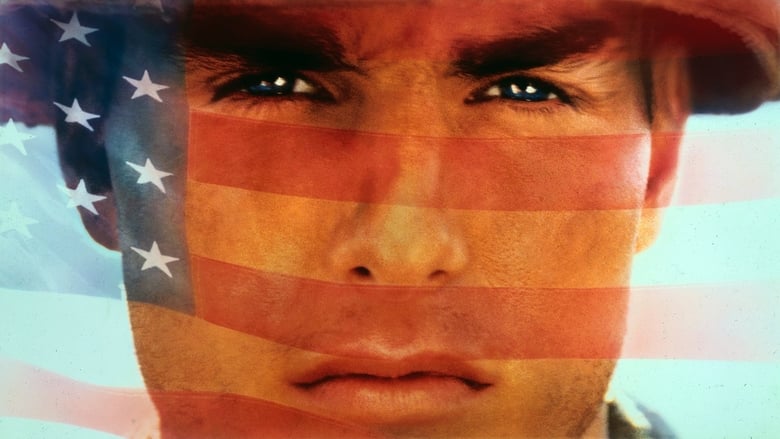← Back to Reviews

in
#302 - Born on the Fourth of July
Oliver Stone, 1989

Based on the true story of Ron Kovic, a Marine who gets paralysed below the waist while serving in the Vietnam War.
On the surface, Born on the Fourth of July feels an awful lot like Oscar-bait, but it's a testament to Stone's rather erratic style of filmmaking that it ends up being more solid than its premise might suggest and still manages to win Oscars while it does so. It's not like it doesn't try to come across as a standard life-during-wartime kind of film - it predictably starts off with an extended prologue showing Kovic (played as an adult by Tom Cruise) attending a 4th of July parade full of veterans and embedding in him the sort of patriotic pride that convinces him to join the Marines straight out of high school. Then there's a relatively condensed Vietnam sequence that plays like an orange-tinged highlight reel of Platoon before Kovic ends up being wounded and hospitalised. What follows after that is a long and arduous journey as Kovic goes from a grimy veterans' hospital to his hometown and all sorts of places beyond that, all while slowly coming to terms with the fact that he can never walk again.
Cruise can do good work when he's got good material to work with, and he manages to play Kovic with believable levels of optimism and despair at all the right points in the film, bringing the right sort of energy to what could otherwise be laughably melodramatic scenes (one scene where he delivers a miserable, drunken tirade to his family has him display the kind of powerful acting that you'd think might have actually won him an Oscar, but considering who actually did win that year, it's not like he lost for lack of trying). Stone surrounds Cruise with a collection of solid performers that float in and out of the film and make for good foils against which Kovic must cope, no matter how much they may or may not understand or sympathise with his frustrations.
The episodic nature of the film, combined with its relatively lengthy running time, do make the whole film feel a little dragged-out regardless of the quality of individual scenes and sequences, especially the extended vignette where Kovic spends his time hanging around in Mexico with a group of other wheelchair-using veterans. There are also a lot of the usual cloying biopic clichés and instances of foreshadowing, which does clash against the otherwise harsh depiction of meaningless Vietnam bloodshed, disturbingly run-down hospitals, and the reality of a lot of veterans who have come home to a country that no longer wants them. Frequent Stone collaborator Robert Richardson also pulls off some brilliant cinematography and makes for some striking images that prop up a film that, while not perfect, is still pretty good at showcasing not just the damaging visceral horrors of war but also the emotional toil that comes afterwards.
Oliver Stone, 1989

Based on the true story of Ron Kovic, a Marine who gets paralysed below the waist while serving in the Vietnam War.
On the surface, Born on the Fourth of July feels an awful lot like Oscar-bait, but it's a testament to Stone's rather erratic style of filmmaking that it ends up being more solid than its premise might suggest and still manages to win Oscars while it does so. It's not like it doesn't try to come across as a standard life-during-wartime kind of film - it predictably starts off with an extended prologue showing Kovic (played as an adult by Tom Cruise) attending a 4th of July parade full of veterans and embedding in him the sort of patriotic pride that convinces him to join the Marines straight out of high school. Then there's a relatively condensed Vietnam sequence that plays like an orange-tinged highlight reel of Platoon before Kovic ends up being wounded and hospitalised. What follows after that is a long and arduous journey as Kovic goes from a grimy veterans' hospital to his hometown and all sorts of places beyond that, all while slowly coming to terms with the fact that he can never walk again.
Cruise can do good work when he's got good material to work with, and he manages to play Kovic with believable levels of optimism and despair at all the right points in the film, bringing the right sort of energy to what could otherwise be laughably melodramatic scenes (one scene where he delivers a miserable, drunken tirade to his family has him display the kind of powerful acting that you'd think might have actually won him an Oscar, but considering who actually did win that year, it's not like he lost for lack of trying). Stone surrounds Cruise with a collection of solid performers that float in and out of the film and make for good foils against which Kovic must cope, no matter how much they may or may not understand or sympathise with his frustrations.
The episodic nature of the film, combined with its relatively lengthy running time, do make the whole film feel a little dragged-out regardless of the quality of individual scenes and sequences, especially the extended vignette where Kovic spends his time hanging around in Mexico with a group of other wheelchair-using veterans. There are also a lot of the usual cloying biopic clichés and instances of foreshadowing, which does clash against the otherwise harsh depiction of meaningless Vietnam bloodshed, disturbingly run-down hospitals, and the reality of a lot of veterans who have come home to a country that no longer wants them. Frequent Stone collaborator Robert Richardson also pulls off some brilliant cinematography and makes for some striking images that prop up a film that, while not perfect, is still pretty good at showcasing not just the damaging visceral horrors of war but also the emotional toil that comes afterwards.
